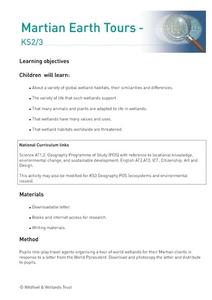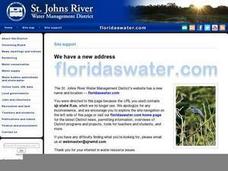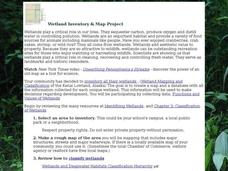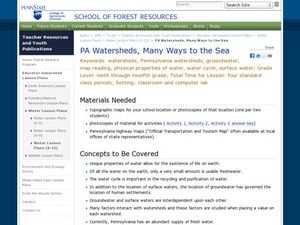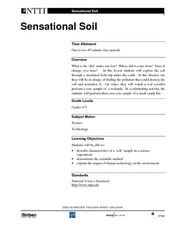Curated OER
Wetland in a Pan
Students examine wetlands and what the effects of destroying them will do. In this wetland lesson students relate the importance of wetland functions to their own needs.
Curated OER
Water Quality Tests Explained
Students define all eight water quality parameters and list at list one source for each of the eight water quality parameters. They determine how each of the eight parameters affect river ecosystems.
Curated OER
Martian Earth Tours
Students study a variety of global wetland habitats, their similarities and differences. They examine the variety of life that such wetlands support and determine that many animals and plants are adapted to life in wetlands, that...
Curated OER
Fieldwork: Horizons Under Ground: Digging Through Wetland Soil
Young scholars study the different soil types and describe the different soils in various environments. In this soil lesson students walk to a reserve and discuss what they saw.
Curated OER
Wacky Water Critters
Students visit a local creek or stream. They collect water samples from the creek and observe and sort the "water critters" they find in the sample, observing smaller organisms under a microscope if necessary. They identify each organism...
Curated OER
Explorit's Wetlands Quiz
In this wetlands worksheet, students complete a 31 question multiple choice on-line interactive quiz about marshes and wetlands.
Curated OER
Lesson 6 - Our Important Wetlands and Uplands
Students examine the benefits wetlands provide to man and nature. They compare types of wetlands in northeast or east-central Florida. They discover ways that uplands affect wetlands and water bodies.
Curated OER
Cypress/Tupelo Swamps
Young scholars study the geologic history of terrain, soils, and drainage patterns. They recognize ecological processes that determine the dynamic nature of habitats. They investigate the influence of human activity on the landscape.
Curated OER
Explorit's Wetlands Quiz
In this wetlands worksheet, students complete a 31 question multiple choice on-line interactive quiz about wetlands. Included are questions about plants, animals and geography.
Curated OER
WONDERFUL, WATERFUL WETLANDS
Students list characteristics of wetland and describe the functions of a wetland.
Curated OER
Wetland Inventory and Map Project
In this wetlands inventory and map project worksheet, students do research on the wetlands and complete a map project about it. Students follow 6 sets of directions with Internet links.
Curated OER
Lotic Environment
Students assemble a classroom river model as an example of a lotic system. They control and measure biotic and abiotic information for the in-class system and compare data with a lotic system in a natural environment.
Curated OER
Aquatic Communities
Students watch a video about aquatic communities. They conduct an experiment that shows how movement of rivers change the landscape. They compare fresh and salt water communities and its wildlife.
Kenan Fellows
Microorganisms in Pond Water
That is living in the water? Groups of two to three view pond water with microscopes in order to find microorganisms. They draw pictures of the ones they find in their slides. The groups compare their drawings to pictures of common pond...
Curated OER
The Water Cycle
Students develop a better understanding of the need to conserve our renewable resources. In this water cycle lesson students take notes, complete a guide sheet and illustrate the water cycle.
Curated OER
PA Watersheds, Many Ways to the Sea
Learners examine the water cycle and the factors that interact with watersheds. In this watersheds activity students describe the purification process, trace the flow of infiltrate water through aquifers, and research the Internet to...
Curated OER
Eutrophication Experiments
Observe two different water samples and write down observations. Write a paragraph which predicts the relative amounts of nutrients, nitrates, and phosphates in the water samples. Compare water samples under a microscope.
Curated OER
Brine Shrimp Hatching Experiment
Learners hatch brine shrimp in a classroom experiment. In this hatching brine shrimp lesson, students participate in two-week lab in which they study how brine shrimp hatch under different conditions. They record data about the control...
Curated OER
Sensational Soil
Fourth and fifth graders explore soil by taking a simulated field trip under the earth. They go to an Internet site that runs a simulation which charges them with finding a source of pollution that could destroy all of Earth's soil, and...
National Wildlife Federation
Quantifying Land Changes Over Time in Areas of Deforestation and Urbanization
Is qualitative or quantitative research more convincing when it comes to climate change? In the eighth lesson during this 21-part series, scholars begin by performing a quantitative analysis of deforestation and urbanization. Then, they...
National Wildlife Federation
When It Rains It Pours More Drought and More Heavy Rainfall
Which is worse — drought or flooding? Neither is helpful to the environment, and both are increasing due to climate change. The 16th instructional activity in a series of 21 covers the average precipitation trends for two different...
Curated OER
Renewable vs. Non-Renewable Resources
Fifth graders are introduced to the important topic of renewable, and non-renewable, resources. They are expected to be able to correctly categorize different types of resources as renewable or non-renewable. Another emphasis of this...
Florida Department of Environmental Protection
Water's Journey Expedition
Step into a scientist's shoes to go online and discover the Florida Springs Expedition, and participate in two activities focusing on how humans impact the environment. The first activity asks scholars to summarize the six dispatches at...
Global Oneness Project
Reclaiming Rivers
Robert Hass's article "Rivers and Stories" underscores the importance of rivers in the development of civilization and the importance of reclaiming supposedly dead rivers and implementing policies that protect river health. Groups...




